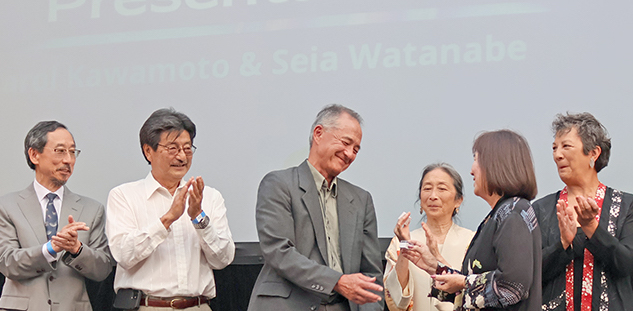Alan Nishi (center) accepts his Ruby Pin from Carol Kawamoto. Also pictured (from left) are Paul Uyehara, Travis Nishi, Carol Kawase and Sharon Ishii-Jordan. (Photo: George Toshio Johnston)
Eventful convention makes smooth landing in Little Tokyo amidst turbulence.
By P.C. Staff
After managing to avoid disaster when the JACL’s National Convention had to change its main venue at almost the last minute, JACL staffers and conventiongoers had one last major hurdle to leap in Los Angeles before Sunday’s two presentations of “Defining Courage,” namely Saturday night’s Sayonara Gala on July 22.
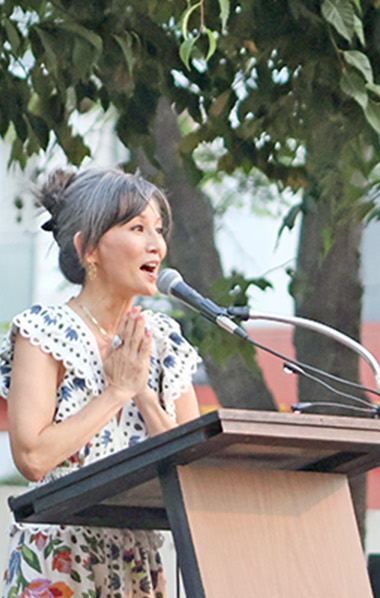
Tamlyn Tomita serves as the Sayonara Gala’s master of ceremonies. (Photo: George Toshio Johnston)
And, with the Writers Guild of America also striking, the convention still managed to ad lib its way to a Hollywood-style happy ending for an outdoor dinner on the Japanese American Cultural and Community Center’s plaza.
Nearby Hollywood managed to lend some grace and enthusiasm, courtesy of actress-activist Tamlyn Tomita playing the role of master of ceremonies. Following a flag ceremony by the Boy Scouts of Troop 764, based at the Venice Japanese Community Center, vocalist Helen Ota sang the “National Anthem” before the Taiko Center of Los Angeles treated the audience to some cloudless thunder.
Dinner was provided by the able staff of Chef Akira Hirose’s Azay restaurant, with dessert made by Little Tokyo fixture Fugetsu-Do.
Dignitaries included former U.S. Rep. Mike Honda; Consul General of Japan in Los Angeles Kenko Sone; Brad and George Takei; past JACL Presidents Ken Inouye, David Kawamoto, Floyd Mori, Jeffrey Moy, Larry Oda (who is serving again in that capacity), Frank Sato (who would later come to the stage for a special presentation) and Floyd Shimomura; Mountain View City Councilmember Margaret Abe-Koga; and Alhambra City Councilmember Jeffrey Koji Maloney.
In an evening filled with special moments, one was the formal presentation of the Ruby Pin — the JACL’s highest service award for long-standing and significant individual contributions over a minimum of 20 years —prefaced by remarks from VP for General Operations Carol Kawamoto and presented with help from VP for Public Affairs Seia Watanabe.
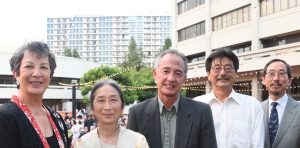
Ruby Pin awardees Sharon Ishii-Jordan, Carol Kawase, Alan Nishi, Travis Nishi and Paul Uyehara (Photo: Kris Ikejiri)
The Ruby Pins went to Sharon Ishii-Jordan of the Midwest District, Carol Kawase and Alan Nishi, both of the Northern California-Western Nevada Pacific District, Travis Nishi of the Central California District and Paul Uyehara of the Eastern District.
When it was time for the evening’s other awards, musical accompaniment came from Haruye Ioka, Keiko Kawashima and Helen Ota of the Grateful Crane Ensemble. The Ralph Carr Award went to John “Jack” Svahn, who served in the Reagan Administration as chief White House Domestic Affairs adviser.
On Aug. 10, 1984, Svahn held a crucial-to-redress meeting with JACL National Redress Committee Chair John Tateishi, Washington JACL Representative Ron Ikejiri, JACL National President Shimomura and Sato, the highest-ranking Japanese American in the Reagan administration, who was later elected JACL national president. Svahn met with the JACL members to hear their request for the White House to put redress on its radar. Thanks to Svahn, that indeed occurred four years later when President Ronald Reagan signed the Redress Bill.
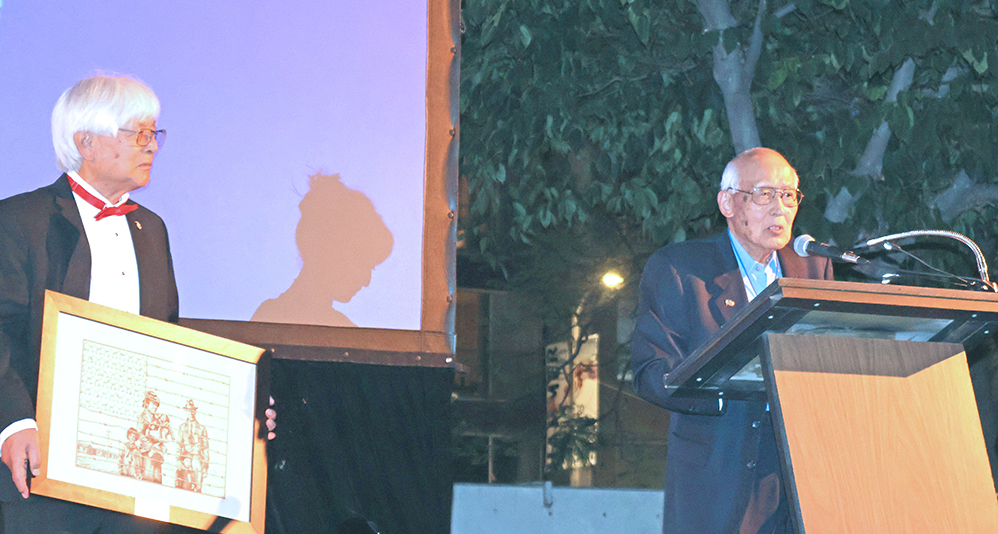
JACL National President Larry Oda holds the Ralph Carr award while listening to former JACL National President Frank Sato speak about the role awardee Jack Svahn had in getting JACL’s concerns about redress to the Reagan White House circa 1984. (Photo: George Toshio Johnston)
Because of the sensitive nature of the meeting, however, Sato told his JACL compatriots that the meeting must be kept under wraps — and it was, until Svahn himself revealed its existence in his 2011 memoir “There Must Be a Pony in Here Somewhere” (see Aug. 19, 2019, Pacific Citizen).
Accepting the award in Svahn’s absence was Sato. “I gratefully accept the Ralph Carr award for Jack and personally thank him for his unwavering support for redress. Jack could not be with us tonight. But he was there when we needed him the most,” Sato said.
Characteristically, in a recorded video, Svahn downplayed his role and said Sato deserved “an awful lot of the credit” and that the final passage and signing of the Redress Bill was a “real team effort from a lot of different people from a lot of different walks in life.” (View the Jack Svahn video here.)
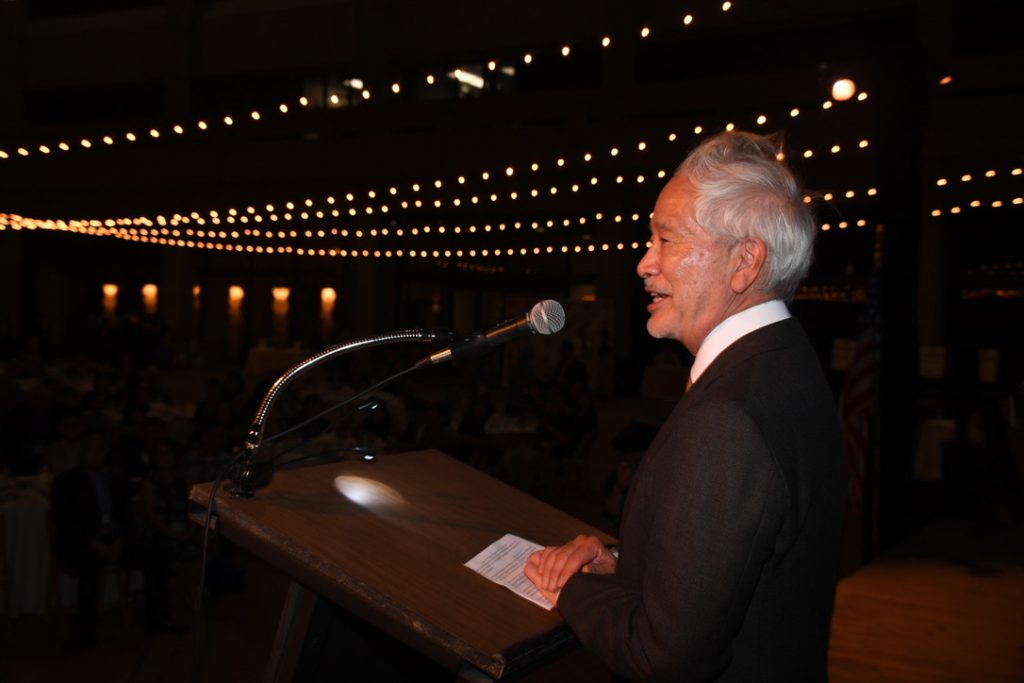
Don Tamaki addresses the audience after reciving the Edison Uno Civil Rights Award. (Photo: Kris Ikejiri)
The Edison Uno Civil Rights Award went to attorney Don Tamaki. Most recently notable as the one Japanese American and sole non-African American serving on the California Reparations Task Force, he was also an attorney on the three coram nobis cases that revisited the World War II Supreme Court cases involving Fred Korematsu, Gordon Hirabayashi and Minoru Yasui. Tamaki was part of the team that revisited Korematsu v. the United States.
After acknowledging how much he admired the vision and audacity of Edison Uno — credited for formally initiating JACL’s course of action on redress — Tamaki said, “I want to thank JACL members for passing resolutions both on the chapter level, and on the national level, supporting recreate reparations for African Americans.”
The President’s Lifetime Achievement Award went to Alan Nishio, who viewed the ceremony remotely while in hospice care, and scientist Dr. Syun-Ichi Akasofu, who spent years studying the aurora borealis phenomenon.
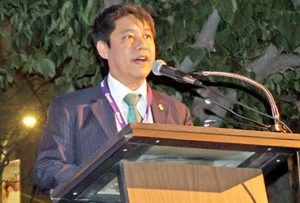
JACL Executive Director David Inoue thanks Little Tokyo community institutions for helping with the JACL’s National Convention when the organization had to change its venue because of the hotel workers strike. (Photo: George Toshio Johnston)
Executive Director David Inoue then said, “I want to thank our hosts tonight and for the past few days, the Japanese American Cultural and Community Center, the Japanese American National Museum and the Los Angeles Hompa Hongwanji Temple , who all really enabled us to hold our convention still rooted here in Little Tokyo, when we had to leave our Little Tokyo-based hotel. Staff and leadership of these institutions have really bent over backwards to ensure that our convention went off smoothly.” He also thanked JACL staffers and volunteers like Nancy Takayama for all their efforts.
Following a video commemoration of community members who died in recent months, the JACL’s 2023 Sayonara Gala signed off.

